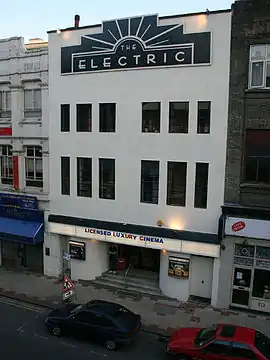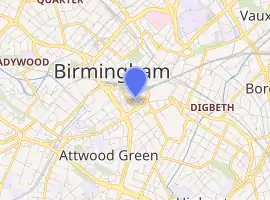The Electric, Birmingham
The Electric is a cinema and sound recording facility in Birmingham, England. It opened in Station Street in 1909, showing its first silent film on 27 December of that year, and is now the oldest working cinema in the country.[1][2] It predates its namesake, the Electric Cinema in Notting Hill, London, by around two months. Originally called the Electric Theatre, the cinema has undergone a number of name changes since its opening, but returned as the Electric in October 1993.
| |
 The Electric in 2005 | |

| |
| Address | 47-49 Station Street Birmingham England |
|---|---|
| Coordinates | 52.4766°N 1.8987°W |
| Owner | Thomas Lawes Media Ltd |
| Current use | |
| Opened | 1909 |
| Website | |
| www | |
History
1900s
The Electric opened on the bank holiday of 27 December 1909 and was Birmingham’s first film theatre. The architectural plans were designed by leading theatre architect of the time, Bertie Crewe (1860-1937) which are now a part of the Library of Birmingham's archives and collections.[3]
Excerpts from newspapers at the time: "There has been a further addition to the number of places of amusement in Birmingham. Electric Theatre (1908), Ltd., of London has taken a commodious shop in Station-Street, right in the centre of the city, and the interior has been transformed into a cosy and attractive entertainment hall with a capacity of 376, in red plush tip-up seats. The machines here are also of the latest Edison type, and brilliantly steady pictures are shown at a throw of about 55 ft. The operating room is similarly equipped, and is one of the finest in the city. [3]
The pictures displayed, some of which are in colours, are of an historical, dramatic, educational, as well as of a humorous character, and the entertainment is proving a decided attraction with young and old alike. Pictures showing this week are To Save Her Soul, Piedmont, The Shell, A Box of Chocolates, The Cabbage, Making Plate Glass, A Workman’s Revenge, and That Skating Carnival, with a complete change on Thursday. Mr. George Putnam, is the energetic manager, and Mr. A. Hart chief man at the wheel. [3]
It is estimated that upwards of two thousand persons paid for admission on the opening day, and from two o’clock until eleven there is a constant stream of fresh arrivals. Mr Putnam is arranging for a constant change of programme, and all the latest and most interesting pictures will be displayed from time to time." [3]
1920s and 1930s
In the 1920s, the cinema was bought out and underwent the first of many name changes, becoming known as The Select showing a programme of silent movies.
In 1931 Joseph Cohen, a highly successful Birmingham entrepreneur, bought The Select and for a few months screened rep films, before closing the cinema in 1932 with a view to a complete refit. His plan was to obtain the uppers floors, then create a balcony and changing rooms for the staff. Architect Cecil E.M.Filmore was hired to help navigate these structural alternations and on 20 March 1937 the film theatre reopened as The Tatler News Theatre. This was the city's second news theatre where rolling news reels from Pathe and British Movietone, along with short films and cartoons were presented.
1950s and 1960s
After World War II, with television becoming increasingly popular, attendance at news theatres declined. In the 1950s, the cinema changed its focus and became The Jacey Cartoon Theatre (Jacey derived from Joseph Cohen's initials). This did not last for long and in the 1960s, it became the Jacey Film Theatre, mainly showing a programme of art house and continental pictures.
1970s
For much of the 1970s, the cinema was a shadow of its former-self, largely showing soft pornographic films.[1] The early 1980s saw a revival, with the cinema taken over by Lord Grade's "Classic" chain and split into two screens. This incarnation did not last for long and in the mid-1980s it became the Tivoli, screening a mix of mainstream. arthouse and exploitation films. In 1993 it was bought by Bill Heine and managed by Steven Metcalf.[4] They also reverted it to being called the Electric.[2]
A contemporary work of art called Thatcher's Children by artist John Buckley was installed in the windows on the front of the building, with the intent to shock and attract publicity to the opening of an art cinema in Birmingham.[5]
2000s
The Electric closed, however, on 12 December 2003.[6]
Renovation and reopening
The cinema was put up for sale and was quickly purchased by a local entrepreneur, Tom Lawes.[2] After a £250,000 refit and renovation, the cinema reopened on 17 December 2004. The building was restored to its original 1930s Art Deco look from photographs taken during that period.
In recognition of its centenary in December 2009, local MPs Tom Watson, Khalid Mahmood and Richard Burden raised a motion in the House of Commons stating that the House:[2]
recognises the value of independent cinemas to the cultural and social life of local communities; celebrates the continued success of Britain's oldest working cinema, The Electric in Birmingham; notes that on 2 December 2009 a centenary celebration is taking place for the cinema that started life as a silent movie theatre, became a news theatre during the Second World War and succumbed to dereliction in 2003.
Two doors to the east of the cinema is Britain's oldest repertory theatre the Old Rep theatre.[7]
References
- "Electric cinema celebrates its centenary". BBC News. 15 December 2009. Retrieved 15 December 2009.
- Walker, Jonathan (3 December 2009). "Birmingham's Electric Cinema congratulated in House of Commons". Birmingham Post. Archived from the original on 23 September 2012. Retrieved 15 December 2009.
- Sources: The Era, Film Gossip and Notices, 22 January 1910, Kinematograph & Lantern Weekly, 7 July 1910, and The Rinking World & Picture Theatre News, 8 January 1910.
- http://www.perrybs.bham.sch.uk/documents/school%20report/That%20Electric%20Feeling.pdf
- http://www.theelectric.co.uk/page.php?page=15
- Huxley, Phill (December 2004). "Electric Cinema re-opens". BBC. Retrieved 29 April 2019.
- https://www.openstreetmap.org/?mlat=52.4766&mlon=-1.8987&zoom=16#map=19/52.47660/-1.89870
